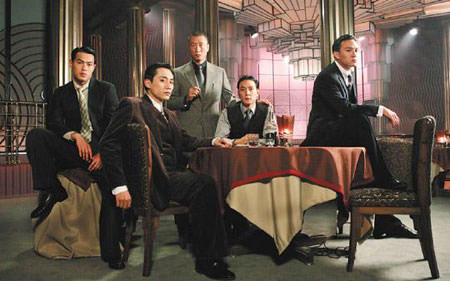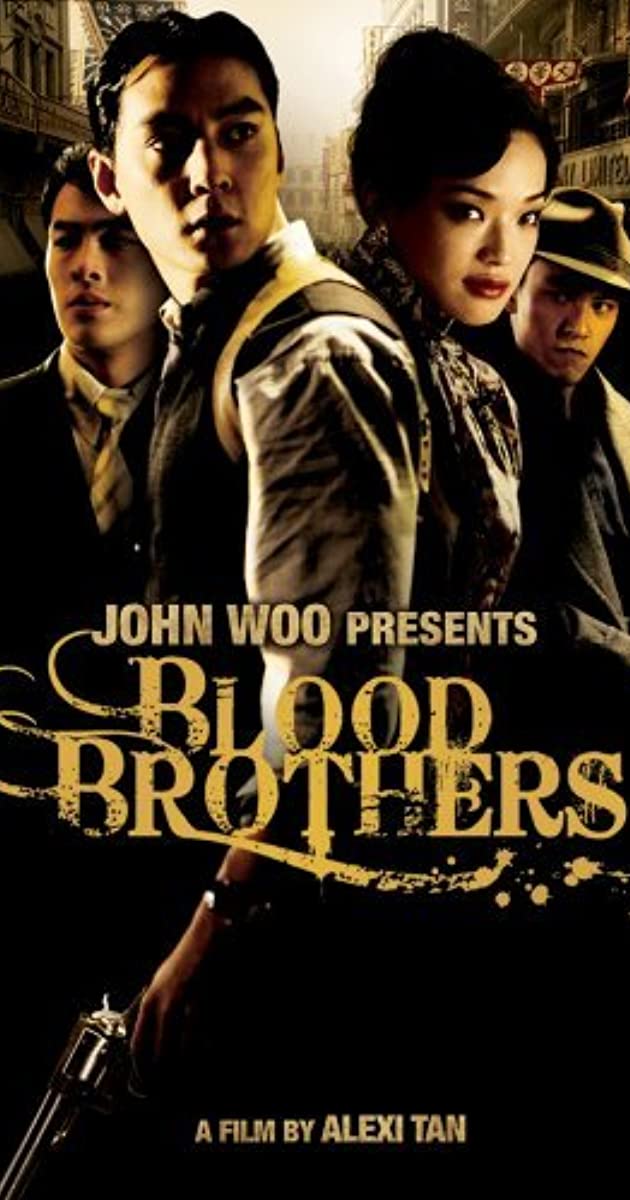Blood Brothers
Blood Brothers follows the story of three childhood friends, Fung (Daniel Wu) and brothers Hu (Tony Yang) and Kang (Liu Ye) as they leave their small 1930s Chinese province and journey to the Chicago-like  Shanghai to seek riches. Somehow, almost inexplicably, Kang quickly becomes an employee of local mob boss Hong (Honglei Sun), the owner of an extravagant nightclub, Club Paradise. Fung and Hu and are soon brought into the enterprise as well, hired to steal competitor’s arm shipments. Fung quickly (too quickly) falls in love with Hong’s mistress and club singer/dancer, the horribly treated Lulu (Qi Shu). The amount of time he spends with her under the nose of Hong, a suspicious, violent maniac, is downright insulting to the film audience’s intelligence. There are many more insults to come before the film finally—gratefully—stops.
Shanghai to seek riches. Somehow, almost inexplicably, Kang quickly becomes an employee of local mob boss Hong (Honglei Sun), the owner of an extravagant nightclub, Club Paradise. Fung and Hu and are soon brought into the enterprise as well, hired to steal competitor’s arm shipments. Fung quickly (too quickly) falls in love with Hong’s mistress and club singer/dancer, the horribly treated Lulu (Qi Shu). The amount of time he spends with her under the nose of Hong, a suspicious, violent maniac, is downright insulting to the film audience’s intelligence. There are many more insults to come before the film finally—gratefully—stops.
Ostensibly inspired by director John Woo’s classic Bullet in the Head (1990), former music video director Alexi Tan’s reworking does himself or Woo no favors. Blood Brothers is tired, uninspired film-making, with no original observations portrayed onscreen, nothing new or perceptive. It’s all gangster cliches taken from earlier, better movies. A few scenes reminiscent of The Godfather only remind one of how good a movie The Godfather was.
 It’s all the more surprising, then, that John Woo produced Blood Brothers. Woo was, at the time, at the tail end of many unrewarding years in Hollywood (the Philip K. Dick-derived and poorly received Paycheck, 2003, being his last previous feature film). He would soon after return to Asian cinema with two two-part historical epics, Red Cliff (2008) and The Crossing (2014/2015), which were only barely released in the states and even then in edited versions. Woo must have seen something promising in Alexi Tan’s directing style, which seems to me wholly unremarkable and even poor in places. Where Blood Brothers really falters, though, is in its script (the acting, especially by Daniel Wu and Qi Shu, is fine as far as the screenplay allows). Collaborating with Dan Jiang and Tony Chan, Tan’s script creates only stereotypes for characters: the bed-ridden, long-suffering mother, the virginal young girl waiting in the provinces, the mistress with a heart of gold. Kang becomes a power-hungry mobster, while his weaker brother Hu becomes a feeble drunkard, unable to embrace their morally reprehensible new life, stumbling around like a stock character from a 1930 MGM melodrama.
It’s all the more surprising, then, that John Woo produced Blood Brothers. Woo was, at the time, at the tail end of many unrewarding years in Hollywood (the Philip K. Dick-derived and poorly received Paycheck, 2003, being his last previous feature film). He would soon after return to Asian cinema with two two-part historical epics, Red Cliff (2008) and The Crossing (2014/2015), which were only barely released in the states and even then in edited versions. Woo must have seen something promising in Alexi Tan’s directing style, which seems to me wholly unremarkable and even poor in places. Where Blood Brothers really falters, though, is in its script (the acting, especially by Daniel Wu and Qi Shu, is fine as far as the screenplay allows). Collaborating with Dan Jiang and Tony Chan, Tan’s script creates only stereotypes for characters: the bed-ridden, long-suffering mother, the virginal young girl waiting in the provinces, the mistress with a heart of gold. Kang becomes a power-hungry mobster, while his weaker brother Hu becomes a feeble drunkard, unable to embrace their morally reprehensible new life, stumbling around like a stock character from a 1930 MGM melodrama.
Blood Brothers looks bright and colorful, with cinematography by Michel Taburiaux coupled with Alfred Yau’s set design. That’s not enough to justify spending two hours of your life. For a more entertaining nightclub-set mob story, try Jackie Chan’s Damon Runyon-inspired Miracles (1989)—or, possibly (I’ve yet to see it), the newly released director’s cut of Francis Ford Coppola’s 1984 The Cotton Club, a mob story taking place in 1930s Harlem. Or the entire series of Terence Winter’s Boardwalk Empire, any episode of which is more compelling than Blood Brothers. There’s nothing in Blood Brothers more menacing than Michael Shannon’s brooding stare.
—Michael R. Neno, 2020 Apr 07